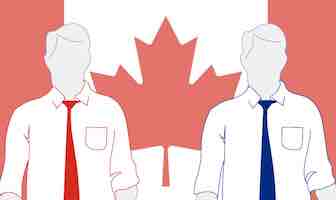Government workers across Canada receive 9.4% higher wages, on average, than comparable private-sector workers
 VANCOUVER—The wage premium and more generous benefits that government workers in Canada enjoy over their private-sector counterparts is one area governments could look to reduce costs following the recession, finds a new study by the Fraser Institute, an independent, non-partisan Canadian public policy think-tank.
“At a time when governments across Canada are facing serious fiscal pressures as a result of the recession, bringing government sector compensation in line with the private sector would help reduce costs without necessarily affecting services,” said Ben Eisen, a senior fellow with the Fraser Institute.
VANCOUVER—The wage premium and more generous benefits that government workers in Canada enjoy over their private-sector counterparts is one area governments could look to reduce costs following the recession, finds a new study by the Fraser Institute, an independent, non-partisan Canadian public policy think-tank.
“At a time when governments across Canada are facing serious fiscal pressures as a result of the recession, bringing government sector compensation in line with the private sector would help reduce costs without necessarily affecting services,” said Ben Eisen, a senior fellow with the Fraser Institute.
- Thursday, June 11, 2020


 VANCOUVER—Long waits for surgery and medical treatment cost Canadians almost $2.1 billion in lost wages and productivity last year, finds a new study released today by the Fraser Institute, an independent, non-partisan Canadian public policy think-tank.
VANCOUVER—Long waits for surgery and medical treatment cost Canadians almost $2.1 billion in lost wages and productivity last year, finds a new study released today by the Fraser Institute, an independent, non-partisan Canadian public policy think-tank.
 CALGARY—From 2014 to 2018, Alberta’s net contribution to federal finances was $94.9 billion, by far the largest contribution from any province during that time period, finds a new study released today by the Fraser Institute, an independent, non- partisan Canadian public policy think-tank.
CALGARY—From 2014 to 2018, Alberta’s net contribution to federal finances was $94.9 billion, by far the largest contribution from any province during that time period, finds a new study released today by the Fraser Institute, an independent, non- partisan Canadian public policy think-tank.
 VANCOUVER—Twenty-five years ago today, Jean Chrétien’s federal government tabled a historic budget that tackled head-on the pressing fiscal challenges facing the nation, finds a new book of collected essays released today by the Fraser Institute, an independent, non-partisan Canadian public policy think-tank.
“The 1995 federal budget was historic not just for its bold fiscal reforms, but also for the 10-plus years of prosperity that followed as a result,” said Jason Clemens, executive vice-president of the Fraser Institute and contributing editor of
VANCOUVER—Twenty-five years ago today, Jean Chrétien’s federal government tabled a historic budget that tackled head-on the pressing fiscal challenges facing the nation, finds a new book of collected essays released today by the Fraser Institute, an independent, non-partisan Canadian public policy think-tank.
“The 1995 federal budget was historic not just for its bold fiscal reforms, but also for the 10-plus years of prosperity that followed as a result,” said Jason Clemens, executive vice-president of the Fraser Institute and contributing editor of  CALGARY—For the first time in 10 years, no Canadian jurisdiction ranks in the top 10 for “investment attractiveness” according to mining executives and investors, finds the
CALGARY—For the first time in 10 years, no Canadian jurisdiction ranks in the top 10 for “investment attractiveness” according to mining executives and investors, finds the  TORONTO—In fiscal year 2019-20, the Ontario provincial government will spend almost $13 billion on debt interest payments, finds a new study released today by the Fraser Institute, an independent, non-partisan Canadian public policy think-tank.
“Since the recession of 2008-09, Ontario’s provincial debt has more than doubled, increasing the interest costs paid by Ontario’s taxpayers,” said Jake Fuss, Fraser Institute economist and coauthor of Interest Costs and their Growing Burden on Canadians.
TORONTO—In fiscal year 2019-20, the Ontario provincial government will spend almost $13 billion on debt interest payments, finds a new study released today by the Fraser Institute, an independent, non-partisan Canadian public policy think-tank.
“Since the recession of 2008-09, Ontario’s provincial debt has more than doubled, increasing the interest costs paid by Ontario’s taxpayers,” said Jake Fuss, Fraser Institute economist and coauthor of Interest Costs and their Growing Burden on Canadians.
 TORONTO—Despite strong job-creation numbers in the Greater Toronto Area and to a lesser extent Ottawa, many cities and rural areas outside these two large regions have experienced little or no job growth over the past decade. So finds a new study released today by the Fraser Institute, an independent, non-partisan Canadian public policy think-tank.
TORONTO—Despite strong job-creation numbers in the Greater Toronto Area and to a lesser extent Ottawa, many cities and rural areas outside these two large regions have experienced little or no job growth over the past decade. So finds a new study released today by the Fraser Institute, an independent, non-partisan Canadian public policy think-tank.
 VANCOUVER—Justin Trudeau is the only prime minister since 1900—and only one of three prime ministers since Confederation—to increase Canada’s per-person debt without facing a world war or recession, finds a new study released today by the Fraser Institute, an independent, non-partisan Canadian public policy think-tank.
VANCOUVER—Justin Trudeau is the only prime minister since 1900—and only one of three prime ministers since Confederation—to increase Canada’s per-person debt without facing a world war or recession, finds a new study released today by the Fraser Institute, an independent, non-partisan Canadian public policy think-tank.
 CALGARY—Despite popular misconceptions, particularly in Central Canada, Alberta (or any province) can compel other provinces and the federal government to negotiate aspects of the Constitution including equalization—but they must do it the right way, finds a new essay released today by the Fraser Institute, an independent, non-partisan Canadian public policy think-tank.
CALGARY—Despite popular misconceptions, particularly in Central Canada, Alberta (or any province) can compel other provinces and the federal government to negotiate aspects of the Constitution including equalization—but they must do it the right way, finds a new essay released today by the Fraser Institute, an independent, non-partisan Canadian public policy think-tank.
 TORONTO—The share of income tax paid by the top 10 per cent of income-earners in Canada is markedly disproportionate to the share of income earned by this group of Canadians, finds a new essay released today by the Fraser Institute, an independent, non-partisan Canadian public policy think-tank.
“Despite common misperceptions and misleading rhetoric, our top 10 per cent of income-earners pay more than half of Canada’s income taxes—and this group includes people that few would consider wealthy,” said Philip Cross, former chief economic analyst at Statistics Canada, senior fellow at the Fraser Institute and author of
TORONTO—The share of income tax paid by the top 10 per cent of income-earners in Canada is markedly disproportionate to the share of income earned by this group of Canadians, finds a new essay released today by the Fraser Institute, an independent, non-partisan Canadian public policy think-tank.
“Despite common misperceptions and misleading rhetoric, our top 10 per cent of income-earners pay more than half of Canada’s income taxes—and this group includes people that few would consider wealthy,” said Philip Cross, former chief economic analyst at Statistics Canada, senior fellow at the Fraser Institute and author of  VANCOUVER—Every high-income country with universal health care allows private medical insurance to cover some necessary health-care costs, except Canada, finds a new study released today by the Fraser Institute, an independent, non-partisan Canadian public policy think-tank.
Currently, the provinces prohibit or severely restrict the ability of Canadians to pay privately for medically necessary services in their efforts to comply with the Canada Health Act.
VANCOUVER—Every high-income country with universal health care allows private medical insurance to cover some necessary health-care costs, except Canada, finds a new study released today by the Fraser Institute, an independent, non-partisan Canadian public policy think-tank.
Currently, the provinces prohibit or severely restrict the ability of Canadians to pay privately for medically necessary services in their efforts to comply with the Canada Health Act.